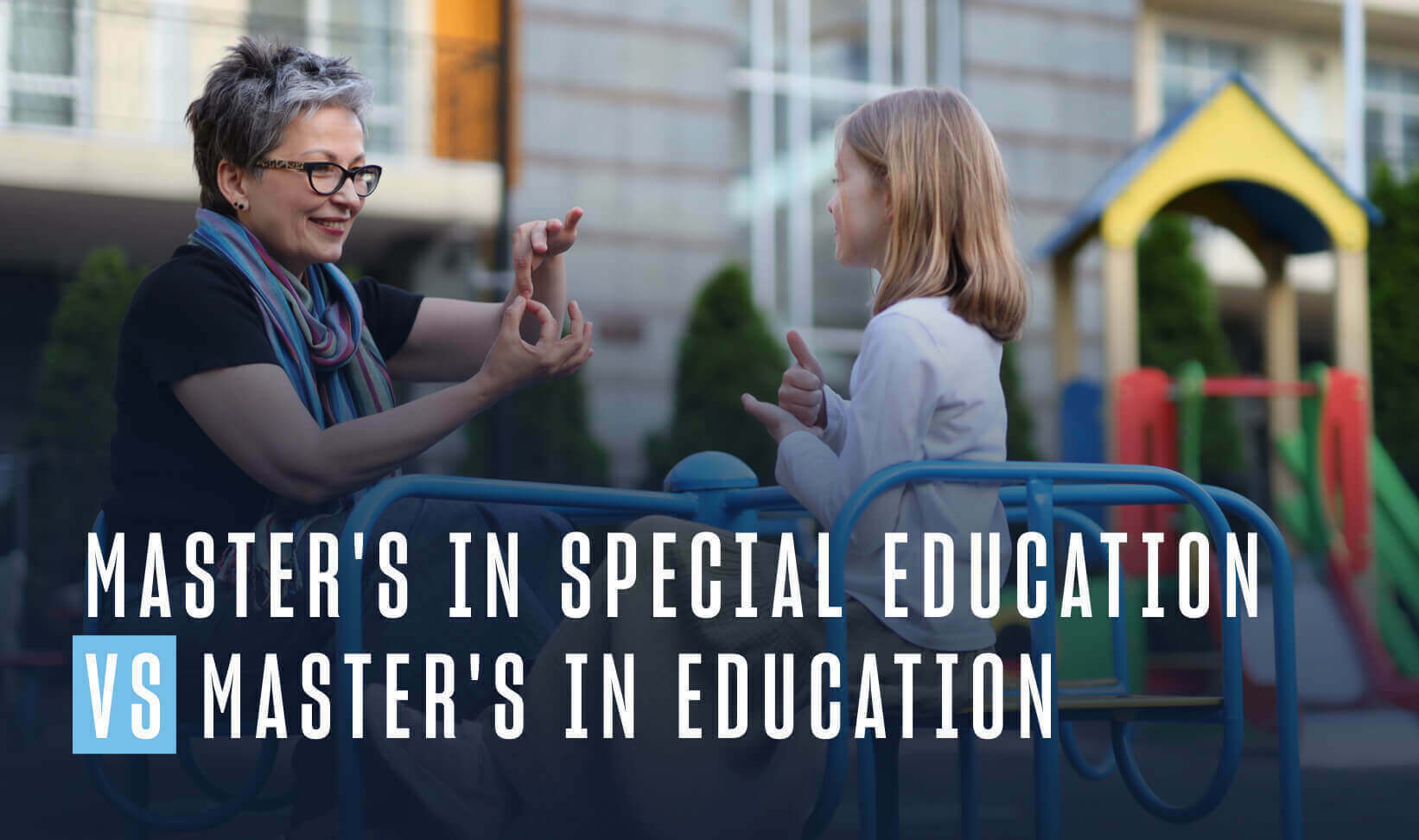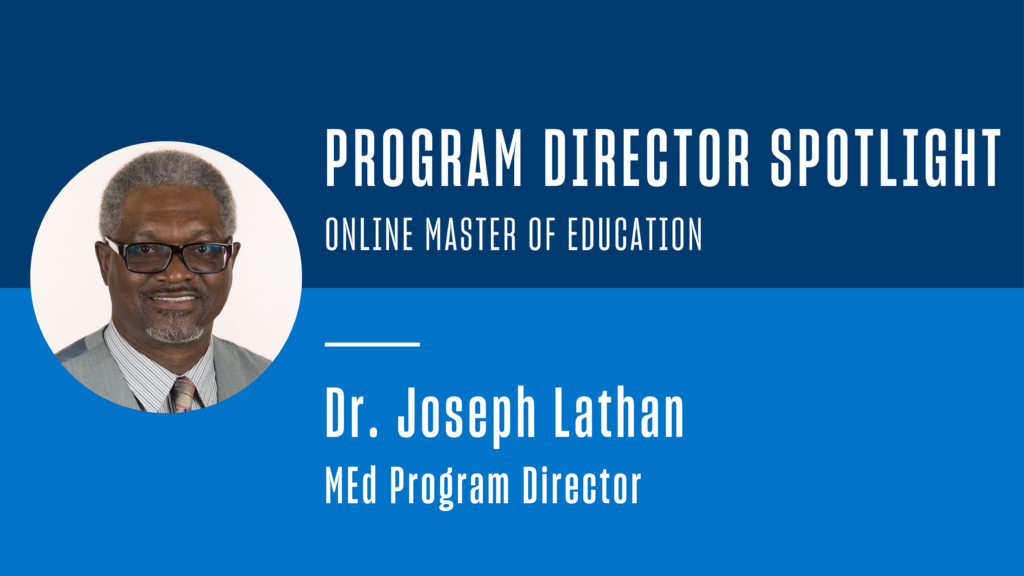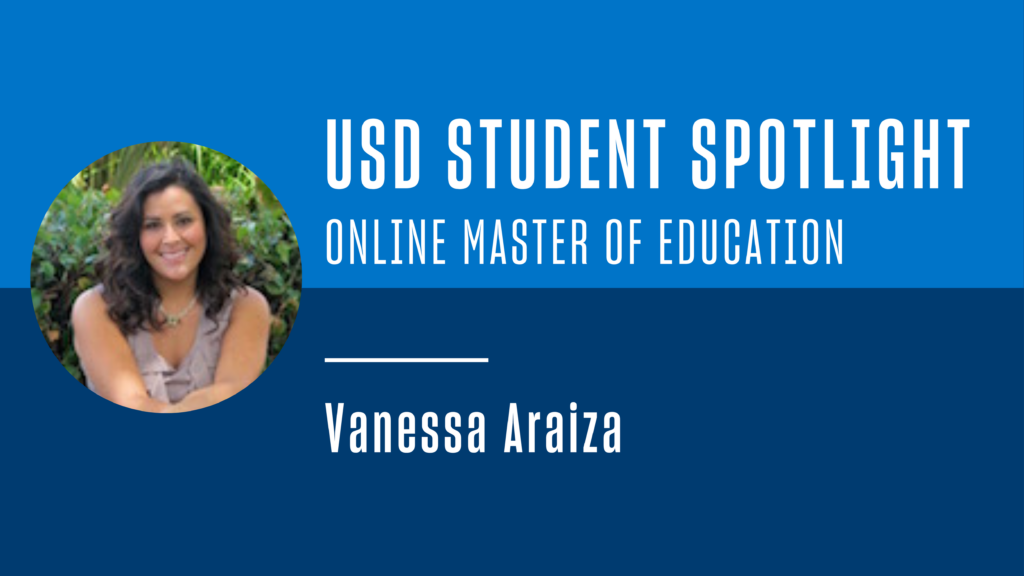Choosing the right graduate degree is a pivotal decision for educators who wish to elevate their careers and make a lasting impact. Depending on your career interests, a Master of Education (MEd) or a Master of Special Education each offer distinct pathways to enhance your skills and expertise in the classroom and beyond.
Whether you’re drawn to the challenges of general education or the rewarding work of supporting students with special needs, understanding the differences and benefits of each program will help you make an informed choice that aligns with your professional goals.
What Is a Master’s in Education?
A Master of Education (MEd) is an advanced academic degree designed for classroom teachers and prospective school administrators. It provides in-depth instruction on educational techniques and policies, preparing graduates to become highly skilled educators, curriculum designers, education specialists or school administrators.
The curriculum equips students with practical teaching skills, educational research methods and an understanding of pedagogy. While an MEd program will not cover special education instruction in-depth, it may cover theories that explore how individuals with learning differences process and retain information, which is crucial for teaching student populations.
An MEd is the most common master’s degree for teachers, followed closely by a Master of Arts in Teaching (MAT). While an MAT focuses more on teaching practice and methodology, an MEd delves deeper into educational theory, research and policy. This degree often attracts students with a bachelor’s degree in education as well as those from related disciplines, such as psychology. Many educators pursue an advanced degree after they’ve already been working as a teacher for some time, or when they enter the profession as a second career.
One of the significant advantages of earning an MEd is the potential for higher pay compared to educators with only a bachelor’s degree. Alongside the rigorous curriculum, teaching certification and fieldwork (i.e. student teaching) are typically integral components of an MEd program, ensuring that students gain practical, hands-on experience.
Earning an MEd also serves as a pathway to career advancement beyond the classroom. It is ideal for traditional classroom teachers looking to move into administration, curriculum development or academic development roles, such as school principals or curriculum designers. Furthermore, it qualifies some educators to teach at the community college level, making it a valuable credential for those looking to broaden their teaching horizons.
Want the Brochure for USD’s Online Master of Education Degree?
Earn your M.Ed. in just 20 months with a program designed for working professionals.
What Is a Master’s in Special Education?
A Master’s in Special Education typically refers to an MEd with a specialization in Special Education. This type of program prepares individuals to apply educational theories when working closely with students with disabilities and perhaps pursue research in the field of special education.
This degree is suitable for individuals who are passionate about working with learners with special needs and those who want to contribute to the field through research and advocacy. Degree candidates learn how to implement inclusive learning strategies, manage classrooms and develop specialized curriculums, ultimately promoting equitable education for all students. Students may choose to specialize in working with learners who have specific needs, including behavioral challenges, certain psychological disorders, developmental disorders, autism spectrum disorders or physical disabilities.
A Master’s in Special Education covers similar (or the same) topics as a general Master’s in Education but focuses more on the application of these theories to students with disabilities. The curriculum for a Master’s in Special Education may include the following components:
- Understanding disabilities and psychological conditions in learners of all ages
- An overview of developmental disorders
- Understanding the impact of disabilities on learning
- Inclusive learning strategies and Universal Design for Learning
- Effective teaching strategies for various disabilities, including emotional disorders, behavioral disorders, learning disabilities, physical disabilities and more
- Classroom management techniques for students with special needs
- Teacher leadership in special education
- Student assessment and evaluation
- Developing an effective special education curriculum
- Legal aspects and special education advocacy
- A capstone project
Students entering this program often have a preexisting interest in special education and may hold undergraduate degrees in related fields such as psychology. Candidates with prior experience working with students with special needs are highly valued; special education master’s programs typically expect applicants to possess relevant knowledge and classroom experience to support their application.
What’s the Difference Between an MEd and a Master’s in Special Ed?
While both degrees share a foundation in advanced educational principles and aim to enhance professional practice, they cater to different professional goals and specializations. The Master of Education offers a broader focus suitable for a wide range of educational roles, while the Master of Special Education provides specialized training for working with students with disabilities and addressing their unique educational needs.
Here is a breakdown of their primary differences:
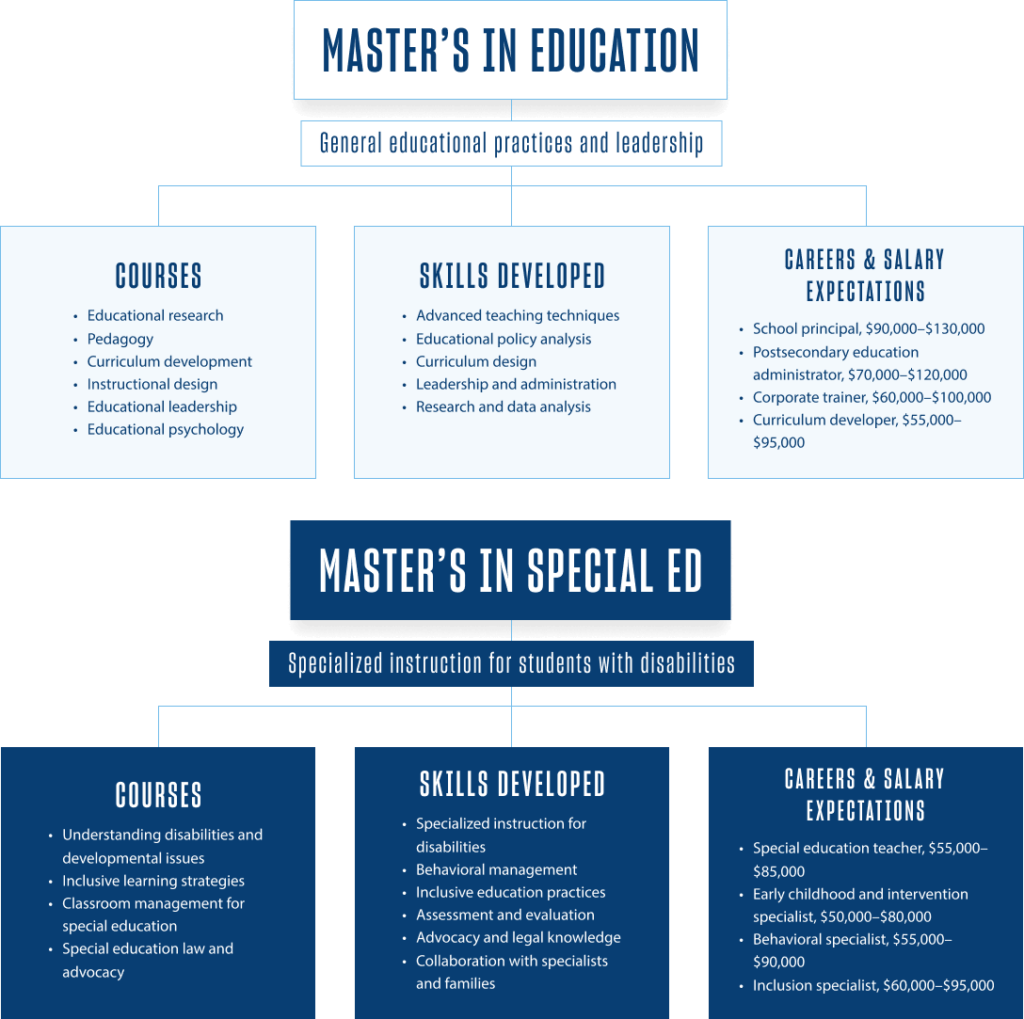
In terms of their similarities, both degrees build on foundational education principles and theories to prepare students for advanced roles in the field of education. Both programs offer advanced coursework in educational theories, instructional strategies and research methods, preparing graduates for leadership roles and providing opportunities for professional growth. Finally, both degrees typically require certification and fieldwork as part of the program, ensuring candidates receive practical, hands-on experience before applying their knowledge in a classroom.
Each degree offers career advancement opportunities in teaching, research, state agencies or school administration.
Are You An Educator Considering the M.Ed Path?
Read the top 11 reasons to earn your master of education degree.
Career Options with an MEd
It’s becoming increasingly common for public schools to require teachers to possess master’s degrees, especially at the elementary level. Therefore, the most common career among MEd holders is classroom teacher ($50,000–$75,000*), but there are many other career paths available with an MEd:
- School principal ($95,000–$140,000): The head administrator of a school, responsible for managing daily operations, setting educational goals and ensuring that students receive high-quality education. They oversee faculty and staff, handle disciplinary issues, manage the school budget and act as a liaison between the school and the community.
- Curriculum developer ($60,000–$100,000): Creates educational programs and materials for schools, colleges or other educational institutions (also known as an instructional designer). They design curricula that meet educational standards, develop lesson plans, select textbooks and resources and assess the effectiveness of the curriculum through feedback and testing.
- Postsecondary education administrator ($75,000–$125,000): Works in colleges and universities, managing student services, academic affairs or admissions. Their duties can include overseeing student recruitment and enrollment, developing academic policies, managing budgets and ensuring compliance with regulations. They often work closely with faculty, staff and students to enhance the educational environment.
- Media specialist/school librarian ($50,000–$80,000): Manages a school’s library and media center. They assist students and teachers in finding and using information resources, teach information literacy skills, manage library resources and support the integration of technology and digital media into the curriculum.
- Instructional coordinator ($60,000–$95,000): Oversees the development and implementation of educational programs and teaching standards (also known as a curriculum specialist). They evaluate the effectiveness of curricula, recommend improvements, provide professional development for teachers and ensure that educational materials and teaching practices align with state and federal guidelines.
- School counselor ($55,000–$90,000): Provides academic, career and personal guidance to students. They help students develop academic plans, address personal or social issues and prepare for postsecondary education or careers. School counselors also collaborate with teachers, parents and administrators to support students’ overall well-being and success. May require additional training in child or teen psychology and mental health counseling.
Anyone with a Master of Education can transition into working with special needs students, provided they obtain the necessary training and credentials. This may involve completing additional coursework or supervised student teaching.
*The salaries in this section are estimates based on 2024 data from Indeed, ZipRecruiter, and Salary.com.
Career Options with a Master’s in Special Education
Similar to the case with the MEd, the most common career for individuals with a Master’s in Special Education is a special education classroom teacher ($60,000–$90,000*). These educators work with students who have a range of disabilities, providing tailored instruction and support to meet their unique learning needs. They develop individualized education programs (IEPs), adapt teaching methods and materials, collaborate with other educators and specialists and monitor student progress.
Other potential careers include:
- Director of special education program ($85,000–$130,000): Oversees and manages special education services within a school district or educational institution. They develop and implement policies, coordinate services and resources, ensure compliance with federal and state regulations and support the professional development of special education staff. They also collaborate with parents, teachers and other stakeholders to ensure that students with disabilities receive appropriate education and support.
- Early childhood and intervention specialist ($55,000–$85,000): Works with young children, typically from birth to age five, who have developmental delays or disabilities. They assess developmental milestones, design and implement early intervention programs, provide support and education to families and collaborate with other professionals to create individualized plans that promote the child’s development and learning.
- Transition team specialist ($55,000–$85,000): Helps students with special needs transition from school to post-school activities, such as higher education, vocational training, employment and independent living. They develop transition plans, coordinate services, provide career counseling and collaborate with students, families, educators and community agencies to ensure a smooth transition and successful post-school outcomes.
- Resource/adaptation specialist ($50,000–$80,000): Provides targeted support and instruction to students with disabilities within general education classrooms. They work with teachers to create accessible learning environments, develop individualized adaptations and implement assistive technologies to support student learning and participation. They also monitor student progress and adjust interventions as needed.
- Curriculum designer ($60,000–$100,000): Creates educational materials and programs tailored to the unique needs of students, including those with disabilities. They develop lesson plans, instructional materials, assessments and educational resources that align with educational standards and best practices. They also work to ensure that the curriculum is accessible and effective for all students.
- Special ed post-secondary instructor ($65,000–$100,000): Teaches courses related to special education at colleges and universities. They prepare future special education teachers and professionals by providing instruction on special education theory, practice, research and policy. They may also conduct research in the field of special education and contribute to academic scholarship.
- Behavioral specialist ($60,000–$95,000): Works with students who exhibit behavioral challenges, providing support and interventions to improve behavior and promote positive outcomes. They conduct behavioral assessments, develop behavior intervention plans, implement strategies to address challenging behaviors and collaborate with teachers, parents and other professionals to support student success.
- Inclusion specialist ($60,000–$95,000): Supports the integration of students with disabilities into general education classrooms. They work to ensure that students receive appropriate accommodations and modifications, provide training and support to general education teachers and promote inclusive practices that allow all students to participate fully in the classroom and school community.
- School psychologist/counselor ($55,000–$90,000): Supports students’ mental health and educational success by addressing psychological, emotional and behavioral needs. May require additional training in child or teen psychology and mental health counseling.
While all of these roles can be affiliated with a school, some can also be part of an independent learning center, tutoring service or nonprofit organization that focuses on special needs populations.
*The salaries in this section are estimates based on 2024 data from Indeed, ZipRecruiter, and Salary.com.
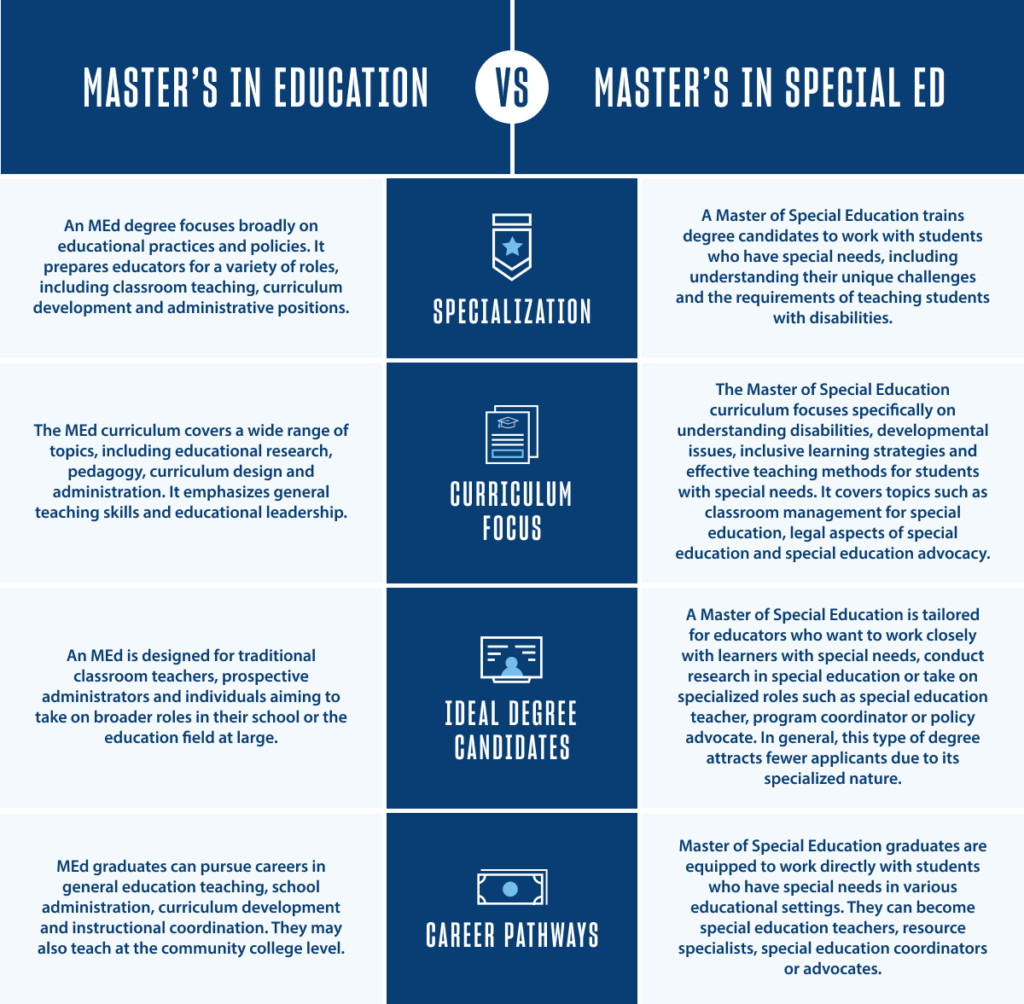
Master of Education vs. Master’s in Special Education: How to Choose
While a bachelor’s degree is the foundational requirement for teaching at the primary or secondary level, advancing your education through a specialized master’s program can open doors to higher licensure, increased earning potential and a broader range of career opportunities.
To decide between earning an MEd or a Master’s in Special Education, you must carefully consider your career goals, interests and the specific benefits each degree offers.
Consider the following benefits of earning an MEd:
- With an MEd, you are generally more employable, as it indicates a higher level of expertise in education.
- An MEd often qualifies you for advanced licensure, making you eligible for higher-level teaching positions.
- MEd program graduates often have higher earning potential and may qualify for student loan forgiveness programs.
- You can teach more subjects and reach a broader range of students, including those in special education programs.
- Advanced training in educational techniques can lead to improved student outcomes.
- An MEd provides opportunities for professional development and networking within the education field.
- Beyond traditional teaching roles, an MEd can open doors to roles in administration, curriculum development and educational policy.
Want the Brochure for USD’s Online Master of Education Degree?
Earn your M.Ed. in just 20 months with a program designed for working professionals.
Bear in mind that each state has its own requirements for teacher certification. Be sure you understand the specific requirements for your state, including any mandates for advanced degrees. For example, some states require that teachers with bachelor’s degrees earn their master’s degree within their first five years of teaching, which is possible while working full-time.
For those with a passion for teaching students with special needs, a Master of Special Education may be the better choice. Completing this type of program carries many benefits:
- Specialized training enables you to deliver better educational outcomes for students with disabilities.
- Special education teachers are in high demand, especially during teacher shortages, making job placement more likely.
- This degree offers opportunities for professional development and networking within the special education community.
- Program graduates typically earn more than those with only a bachelor’s degree.
- The specialized knowledge and qualifications gained can lead to roles beyond traditional classroom teaching, such as special education administration or advocacy.
- You can teach both general and special education subjects, enhancing your versatility and job opportunities.
- The degree often qualifies you for advanced licensure in special education.
If you are leaning toward earning a Master of Special Education, keep a few points in mind. First, understand your state’s specific requirements for special education teachers, including whether a master’s degree is required immediately or within a certain timeframe. It also helps to stay proactively informed about potential state-level changes in certification and licensing requirements.
If you are hesitant to earn your master’s degree, be aware that certification and licensing requirements may change in your state, potentially requiring all teachers — including those in special education — to have a master’s degree in the future.
Consider the following when making your ultimate decision:
- Determine whether you are more interested in general education or specializing in working with students with disabilities.
- Research the demand for general versus special education teachers in your desired location.
- Verify the certification and licensing requirements for your state, keeping in mind that they may change in the future.
- Consider the long-term benefits of each degree, including potential for higher income, job stability and career advancement opportunities.
- Reflect on your passion and interest in working with student populations or specializing in certain demographics.
By carefully evaluating these factors, you can choose the degree program that best aligns with your professional aspirations and personal interests.
Ready to take the next step in your education career? Explore the online MEd Inclusive Learning Specialization at the University of San Diego. This program equips you with the skills and knowledge to create inclusive learning environments and effectively support student populations, all on a convenient and flexible schedule. Visit the MEd program page to learn more and start your journey toward becoming a leader in education.

